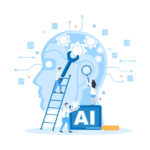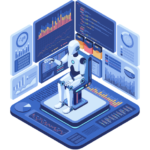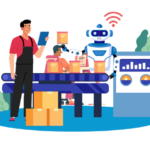
AI SaaS Application Ideas are redefining productivity, optimizing business operations, and catapulting companies into the digital future with unparalleled efficiency.
AI or artificial intelligence has been a buzzword in the tech industry for the past few years.
AI-powered applications have the potential to revolutionize the way businesses operate. SAAS or software as a service is another rapidly evolving field that offers businesses the flexibility and agility to improve their productivity and profitability.
When combined, AI and SAAS can create powerful solutions that can significantly impact business growth.
In this article, we will explore some of the most promising AI SAAS application ideas that can transform businesses across various industries.
AI-Driven Customer Support Solutions – AI SAAS Application Ideas
One of the most promising fields for AI SAAS applications is customer support. With the help of AI, businesses can provide automated, 24/7 customer service without compromising on quality. Here are some examples of AI-driven customer support solutions:
Chatbots
Chatbots are AI-powered virtual assistants that can converse with customers in a natural language, answering their queries, resolving issues, and providing personalized recommendations. They can also be integrated with social media platforms, messaging apps, and phone systems. Chatbots can handle a large volume of customer interactions simultaneously, reducing the workload on human agents.
Virtual Assistants
Virtual assistants are similar to chatbots, but they are designed to perform specific tasks rather than engaging in open-ended conversations. For example, a virtual assistant can help customers book appointments, track orders, or reset passwords. They can be integrated with voice-activated devices like Amazon Echo and Google Home, offering a hands-free and convenient experience.
Sentiment Analysis Tools
Sentiment analysis tools use AI algorithms to analyze customer feedback and detect the emotions and attitudes behind them. This allows businesses to identify common pain points, track customer satisfaction, and improve their products and services. Sentiment analysis tools can be integrated with social media, email, and review platforms.
AI-driven customer support solutions offer several advantages for businesses:
- 24/7 availability: AI-powered systems can handle customer inquiries round the clock, improving customer satisfaction and reducing response times.
- Cost-effective: automated customer support solutions can reduce the need for human agents, saving on labor costs and increasing efficiency.
- Personalized experience: AI-powered systems can analyze customer data and provide tailored recommendations, enhancing the customer experience.
Some examples of successful AI-driven customer support implementations include:
“Domino’s Pizza created a voice-activated chatbot that allows customers to place orders and track deliveries through voice commands. The chatbot uses natural language processing (NLP) and machine learning to understand customer requests and adapt to their preferences. The chatbot has been well received, with over 50% of orders coming through the AI-powered system.”
“Bank of America uses an AI-powered chatbot called Erica to provide financial advice and assistance to its customers. Erica can analyze customer transactions, detect potential fraud, and offer personalized financial tips. Erica has been used by over 7 million customers and has won several awards for its innovative approach to banking.”
AI-Powered Sales and Marketing Tools – AI SAAS Application Ideas

The potential of artificial intelligence (AI) in improving sales and marketing processes is vast. The ability to leverage predictive analytics, lead scoring algorithms, personalized recommendations, and automated campaign management has made AI-powered sales and marketing tools increasingly popular. These solutions enable businesses to streamline their sales and marketing efforts and deliver targeted, personalized campaigns to their audiences.
One prominent example of AI-based sales tools is Salesforce’s Einstein. Einstein uses machine learning algorithms to analyze customer data and guide sales teams on the most promising leads and best sales strategies. By automating the lead scoring process, Einstein helps businesses prioritize leads and focus efforts on those most likely to convert.
Another common use case for AI in marketing is personalized product recommendations. Amazon’s recommendation engine uses customers’ browsing and purchasing behavior to suggest products they are more likely to buy. This personalized shopping experience has helped Amazon become one of the most successful eCommerce businesses worldwide.
AI-powered content marketing is also on the rise. Tools such as Acrolinx use natural language processing (NLP) algorithms to analyze and optimize content for readability, tone, and SEO. By automating processes like editing and proofreading, businesses can create high-quality content in a shorter time.
AI marketing solutions can also customize advertising campaigns and messaging. Adgorithms, a company that specializes in AI-driven advertising, uses machine learning algorithms to identify the best audience segments for a campaign, create ad copy, and determine the best time and platform for each ad. By optimizing these processes, businesses can increase their ad conversions and generate more sales.
AI-Enabled Data Analysis and Insights – AI SAAS Application Ideas
As businesses gather more data than ever before, the challenge of analyzing and making sense of it can be overwhelming. That’s where AI comes in, with the ability to streamline data analysis and offer valuable insights.
AI-powered data analysis tools can automate tasks such as data cleaning and pattern recognition, allowing for faster and more accurate analysis. By recognizing patterns and trends, businesses can make data-driven decisions that lead to improved outcomes and increased efficiency.
One example of AI-enabled data analysis is predictive maintenance, which uses machine learning algorithms to analyze data from equipment sensors and predict when maintenance will be required. This can help companies avoid costly breakdowns and downtime.
Another area where AI excels is trend forecasting. By analyzing large data sets, AI algorithms can identify patterns and make predictions about future trends. This can be particularly useful in industries such as finance, where accurate predictions can have a significant impact on investments and profits.
Overall, AI-powered data analysis and insights can greatly benefit businesses by providing a competitive edge through more informed decision-making.
AI-Driven Supply Chain Management – AI SAAS Application Ideas
Supply chain management is a critical aspect of any business, and AI can play a pivotal role in optimizing the process.
Through AI-powered demand forecasting, businesses can accurately predict demand, reduce inventory carrying costs, and minimize stock-outs. AI can also assist in logistics by providing real-time visibility into shipment locations, delivery times, and potential disruptions, enabling businesses to proactively resolve issues and optimize routes.
Predictive maintenance is another area where AI can help reduce downtime and maintenance costs. By analyzing data collected from sensors and equipment, AI-powered solutions can predict when maintenance is needed, allowing businesses to schedule maintenance proactively and avoid unexpected downtime.
Implementing AI in supply chain management can provide significant benefits to businesses, including increased efficiency, cost savings, and improved customer satisfaction.
| AI-Powered Solutions for Supply Chain Management | Use Case |
|---|---|
| Demand Forecasting | A global retail company used AI to analyze sales data, weather patterns, and social media sentiment to predict demand for specific products, resulting in a 20% reduction in inventory carrying costs. |
| Logistics Optimization | A logistics company used AI to optimize delivery routes, reducing delivery times by 30% and saving $4 million in fuel costs. |
| Predictive Maintenance | A manufacturing company used AI to predict equipment failure, reducing downtime by 40% and maintenance costs by 15%. |
AI-Driven Supply Chain Management Challenges
While AI can provide significant benefits to supply chain management, there are also challenges to consider. AI-powered solutions require massive amounts of data, which can be difficult to collect and manage, and data privacy concerns must be addressed.
In addition, integrating AI solutions into existing systems can be complex, and user acceptance of new technology can be a hurdle to overcome.
Despite these challenges, businesses that successfully implement AI in supply chain management stand to gain significant competitive advantages.
AI for HR and Recruitment – AI SAAS Application Ideas

Artificial intelligence has paved the way for more efficient and accurate HR processes. With AI-powered HR solutions, businesses can streamline recruitment, employee management and retention, and workforce planning.
Automated Candidate Screening
AI can assist HR teams in screening resumes and applications of potential candidates. By using Natural Language Processing (NLP) and Machine Learning (ML) algorithms, AI-powered software can identify the best-fit candidates for specific job positions by analyzing their skills, experience, education, and qualifications. This process saves time and reduces bias, leading to more diverse and inclusive hiring practices.
Employee Sentiment Analysis
Employee surveys and feedback can provide valuable insights into organizational and managerial performance. AI can be used to analyze employee sentiment and feedback in real-time, detecting patterns and anomalies across large datasets. This information can help HR teams identify areas for improvement, enhance employee satisfaction, and prevent employee turnover.
Workforce Planning
AI-powered analytics tools can help HR teams predict future workforce needs and plan accordingly. This includes forecasting headcount, identifying skill gaps, and predicting employee turnover rates. Predictive analytics tools can help HR teams make data-driven decisions and allocate resources more effectively.
Overall, AI can enhance HR and recruitment operations by automating repetitive tasks, reducing bias, and improving decision-making. However, businesses must also consider the ethical implications of using AI in HR, such as data privacy, security, and potential discrimination. By leveraging AI responsibly, businesses can optimize their HR processes and drive growth.
AI-Assisted Content Creation – AI SAAS Application Ideas
The use of artificial intelligence in content creation has become increasingly prevalent in recent years. From automated writing to video editing and content optimization, businesses are leveraging AI to improve their content marketing strategies. AI-assisted content creation has several benefits, including improved efficiency, accuracy, and personalization.
One of the primary advantages of AI-powered content creation is its ability to automate tasks that would otherwise be time-consuming and labor-intensive. For instance, AI can be used to generate content ideas based on user preferences, perform research on relevant topics, and even write articles and blog posts.
Another benefit of AI in content creation is its ability to ensure accuracy and consistency across different pieces of content. AI algorithms can check for spelling and grammar errors, ensure that brand guidelines are followed, and even detect plagiarism.
AI can also help personalize content for different audiences by analyzing user data and tailoring content to their preferences. For example, AI can be used to recommend content based on a user’s browsing history or social media activity.
Examples of AI-Assisted Content Creation
Several companies have successfully implemented AI-powered content creation tools in their marketing efforts. One such example is Forbes, which uses an AI platform called Bertie to generate article summaries and suggest headlines for writers. Another example is The Washington Post, which uses an AI tool called Heliograf to write automated news articles on specific topics.
| Benefits | Examples |
|---|---|
| Improved Efficiency | Forbes: Bertie |
| Accuracy and Consistency | The Washington Post: Heliograf |
| Personalization | Netflix: Content Recommendations |
Netflix is another company that uses AI to personalize content for its users. The streaming giant uses AI algorithms to analyze user data, such as viewing history and search queries, to recommend content based on their interests and preferences.
“AI-assisted content creation has revolutionized the way businesses create and distribute content. By automating tasks and personalizing content, AI has enabled businesses to improve their marketing efforts and connect with their audiences more effectively.”
AI-Enhanced Cybersecurity – AI SAAS Application Ideas

Cybersecurity is a major concern for businesses across industries. With the increasing frequency and sophistication of cyber attacks, organizations are looking for ways to improve their security measures. AI-powered solutions can significantly enhance cybersecurity by detecting and responding to threats in real-time.
AI-based security systems use machine learning algorithms to analyze vast amounts of data, identify patterns and anomalies, and predict potential threats. They can also automatically respond to security incidents, reducing the response time and minimizing the impact of attacks.
One of the key advantages of AI-based cybersecurity solutions is their ability to adapt and learn over time. As new threats and attack methods emerge, the system can quickly update its algorithms and defenses to stay ahead of the curve.
AI-powered security solutions can detect a wide range of threats, including malware, phishing attacks, and insider threats. They can also monitor user behavior and identify suspicious activities, such as unauthorized access to sensitive data or unusual login patterns.
AI Threat Detection in Action: Darktrace
Darktrace is an AI-powered cybersecurity platform that uses machine learning and advanced analytics to detect and respond to cyber threats in real-time. It can monitor network traffic, cloud environments, and IoT devices to identify potential security risks and anomalies.
| Key Features: | – Self-learning AI algorithms |
|---|---|
| – Real-time threat detection and response | |
| – Automated incident response |
“Darktrace’s AI is unique, and when investigating insider threats, it has allowed us to find activity that we wouldn’t have found otherwise.” – Head of IT security, Toyota
Darktrace’s AI-powered security solutions have been widely adopted by organizations in various industries, including finance, healthcare, and manufacturing. Its innovative approach to cybersecurity has earned it multiple awards and recognition as a leader in the industry.
As businesses increasingly rely on digital technologies and cloud-based systems, the need for robust cybersecurity measures has become more pressing. AI-powered solutions offer a promising path forward, enabling organizations to strengthen their defenses and protect their assets from cyber threats.
AI SAAS Application Challenges and Considerations – AI SAAS Application Ideas
Implementing AI SAAS applications can be a game-changer for businesses, but it also comes with its own set of challenges and considerations. Here are some factors to keep in mind:
Data Privacy
One of the most significant concerns with AI SAAS applications is data privacy. Companies must ensure that their data is protected and that any third-party vendors handling their data comply with relevant regulations and industry standards. Businesses must also ensure that they have adequate consent and disclosure protocols in place for collecting and using personal data.
Ethical Concerns
There are also ethical considerations to take into account when implementing AI SAAS applications. For example, ensuring none of the algorithms reinforce biases or discriminate against certain groups. Further, AI applications must be transparent, so users know the system is performing as expected, and that users do not feel as though they are being monitored unjustly.
Integration Complexity
Another challenge is integration complexity. Integrating AI SAAS tools with existing systems and software can be complicated, and requires significant coordination between different teams and departments. Businesses must ensure that they have a clear plan and experienced team to manage the integration process.
User Acceptance
Finally, user acceptance is another significant consideration to keep in mind. Some users may feel uncomfortable or distrustful of AI-powered solutions. Companies must ensure that users understand how and why the AI solution is being used and offer alternative solutions when AI is not preferred. Also, a user-friendly interface must be provided, and user experience should always be a top priority when implementing AI SAAS applications.
Frequently Asked Questions about AI SAAS Applications

As the use of Artificial Intelligence (AI) becomes more popular in the SAAS industry, many businesses have queries and concerns about its implementation and effectiveness.
Here are some frequently asked questions about AI SAAS applications:
What are AI SAAS applications?
AI SAAS applications are software as a service solutions that leverage the power of AI technologies to provide automated and intelligent solutions for various business operations. These applications use machine learning algorithms, natural language processing, and other AI techniques to improve efficiency, productivity, and decision-making capabilities.
What are some examples of AI SAAS applications?
There are numerous AI SAAS applications available in the market, each catering to different business needs. Some popular ones include Chatbots for customer support, Automated marketing and sales analytics, and AI-enabled data analysis tools.
How can AI SAAS applications benefit businesses?
AI SAAS applications can provide businesses with several benefits, such as improved accuracy and efficiency, reduced operational costs, better customer engagement, and enhanced decision-making capabilities. These applications can also help businesses gain insights into consumer behavior, market trends, and opportunities that can aid in business growth.
Are there any ethical or privacy concerns regarding AI SAAS applications?
AI SAAS applications deal with sensitive business and customer data, and there are potential ethical and privacy concerns associated with their use. Businesses must ensure that they comply with data protection laws and ethical guidelines while using these applications. They must also ensure that the AI algorithms used in the application do not display any biases or discrimination towards any particular group of individuals.
What are some of the challenges involved in implementing AI SAAS applications?
Implementing AI SAAS applications can be challenging as it requires companies to have the necessary technical expertise and infrastructure for deployment, integration, and management of these applications. The significant costs associated with these applications, along with the need for continuous updating and maintenance, can also be a challenge for many businesses.
How can businesses ensure successful implementation and adoption of AI SAAS applications?
Businesses can ensure successful implementation and adoption of AI SAAS applications by identifying their specific business needs and selecting the most appropriate application that fits their requirements. They must also ensure that they have adequate technical and human resources to deploy and maintain these applications effectively. Additionally, it is crucial to provide adequate training and support to employees to ensure their acceptance and use of these applications.
These are some of the common queries and concerns related to AI SAAS applications. By understanding the benefits, challenges, and best practices involved in the implementation and adoption of these applications, businesses can leverage the power of AI to enhance their operations and drive growth.
Benjamin Bale is a distinguished expert in the field of AI development and an esteemed author for the “Hire AI Developer” blog. With a remarkable decade-long experience in the industry, Benjamin has cemented his reputation as a leading authority in AI app and website development, as well as AI backend integrations. His profound passion for AI and its transformative potential is evident in every aspect of his work.
Benjamin’s journey into the world of AI began at Edinburgh University, where he pursued his studies in AI and Mathematics. It was during this time that he cultivated a deep understanding and fascination for the subject. Throughout his career, Benjamin has accumulated extensive experience working with industry giants such as Goldman Sachs, Tencent, and Ali Express. These invaluable experiences have not only sharpened his skills in integrating existing systems with AI APIs but have also solidified his status as a consummate professional in the field.
Currently residing in the vibrant city of London, Benjamin finds solace in his role as both an author and developer. Beyond his professional endeavors, he takes great joy in the company of his faithful canine companion, Chad, and indulges his passion for snowboarding in the picturesque mountains of France. Benjamin’s unwavering dedication to advancing AI technology, combined with his wealth of knowledge and practical expertise, make him an invaluable asset to the “Hire AI Developer” team and an invaluable resource for readers seeking profound insights into the realm of AI.








